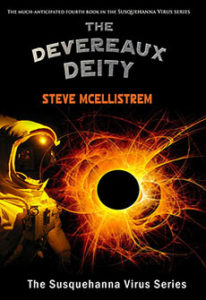HYPERTEXT MAGAZINE ASKED STEVE MCELLISTREM, AUTHOR OF DEVEREAUX DEITY, “WHAT QUESTION DO YOU WISH YOU’D BEEN ASKED ABOUT YOUR WORK?”
By Steve McEllistrem
Here’s a question I wished someone had asked me:
Why should I read science fiction when it’s so much more fun to watch it on the screen, where I can see all the fantastic imagery and not have to work through tedious descriptions of futuristic technology?
First of all, not all science fiction involves tedious descriptions of futuristic technology, though some of it does. However, the best science fiction comprises a literature of ideas, of possibilities. It examines the world as it is, points out the direction we’re heading, the mistakes we’re making, and issues a warning, offering us an off-ramp, if we have the courage to act.
Science fiction allows us to contemplate our best and worst selves, what we hope and fear about tomorrow. It enables us to consider what might be without assessing blame in the here and now, without overly demonizing. Instead it asks, “What if?” and then shows us the ramifications of continuing along the path we currently trod.
The problem with only encountering science fiction in the movies and on TV is that those media are subject to certain demands — alien creatures or space battles or bizarre landscapes that draw the eye to their otherness. Yes, they sometimes still present interesting ideas, but they are captive to the necessities of showing us the wonders of film or digital video.
A good movie can’t slow down too much or it will lose its audience. And the budget on a sci-fi movie is often massive, requiring a return on investment that brooks little in the way of philosophizing. “We need six big battles and two love scenes and dozens of explosions.”
I’m a fan of sci-fi movies and TV, and yet, when I watch those shows, I often find myself bored by the C.G.I. (computer generated imagery) effects. They need the human element, the rooting for a hero and against a villain. When thousands of ships fire at other ships in the blackness of space, my eyes grow weary.
On the other hand, when I read a great science fiction book like Dune or Foundation or Fahrenheit 451, I savor how skillfully the author weaved in the issues we might have to face should we continue to chase the kinds of policies we seem hell-bent on pursuing. The future need not be dystopian. Indeed, in my writing, it isn’t. It’s partly wonderful and partly terrible, just like the present.
Which brings me to the second reason you should read sci-fi instead of just watching it on TV or at the movie theater: characters. The characters in books can be built with so much more depth. They can go into thoughts and emotions that a more visual medium can’t afford to delve into with quite so much gusto.
My characters are partly good and partly bad, just like us. Their motivations are often well-intended even as their actions sometimes leave a bit to be desired. They’re three-dimensional and often uncertain about whether they’re doing the right thing, which makes them easy to relate to.
I’ve had many people tell me they were amazed at my writing. They were expecting a summer beach read, lots of bang and whiz and technobabble, and were surprised that my books were packed with issues of substance and characters of great complexity. That’s great to hear, but I wish I heard it more often.

Steve McEllistrem has been a writer and editor for more than 25 years. His novels include The Devereaux Dilemma, which was a finalist for a 2014 International Book Award, its sequel The Devereaux Disaster, a finalist for a 2015 International Book Award in Science Fiction, The Devereaux Decision, named a finalist for the Minnesota Book Award, the Midwest Book Award and the International Book Award, and The Devereaux Deity, recently named a finalist for a 2017 Midwest Book Award.
In addition, he is one of the editors of — and a contributor to — Boundaries Without: The Calumet Editions 2017 Anthology of Speculative Fiction.
He has also written numerous nonfiction books, including Higher Education Law in America and Deskbook Encyclopedia of Employment Law. He has been a producer and host of Write On! Radio in Minneapolis, where he has interviewed local, national and international authors, for many years. He tweets with the handle @SteveMcEllis.
Buy
The Devereaux Deity here.

